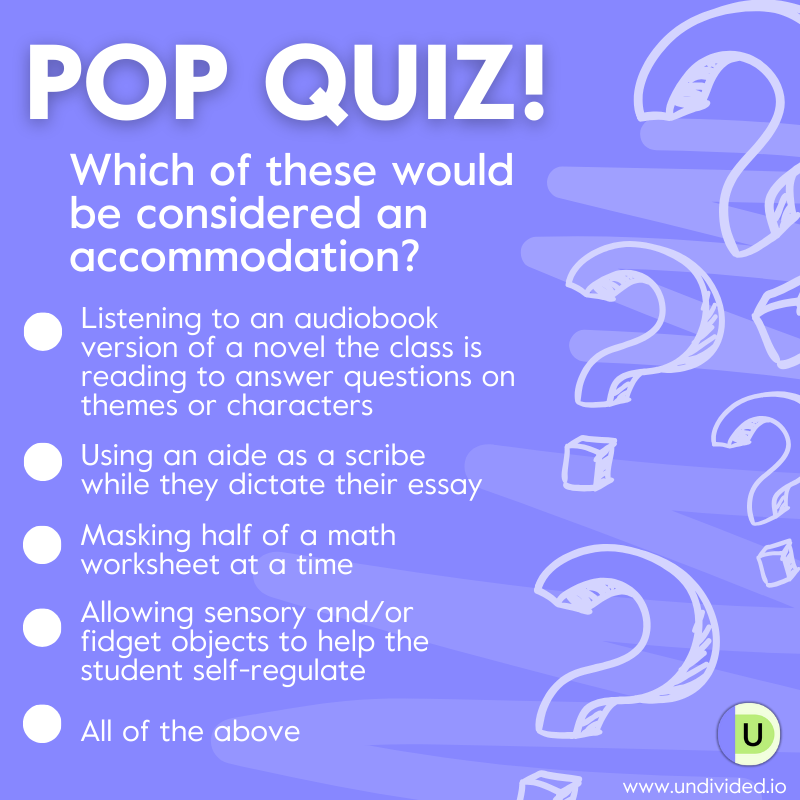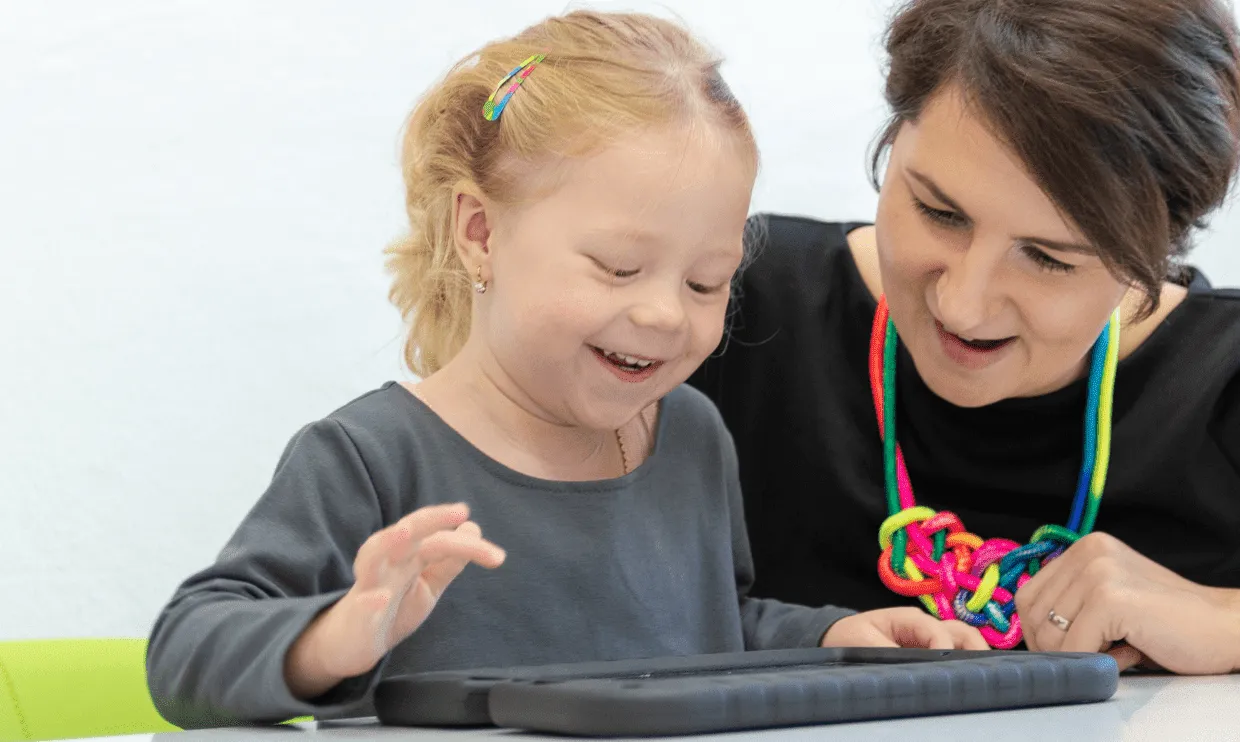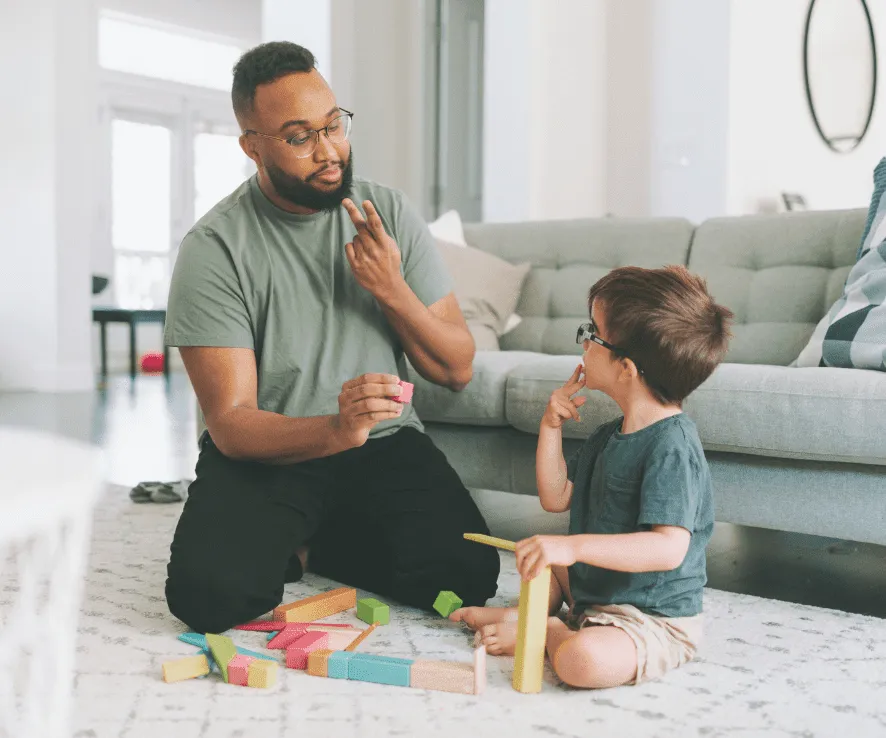With the start of a new school year, we all want to make sure that the supports our kiddos need to thrive in school are in place — and actually being implemented in their classrooms. This includes accommodations, which are vital in removing barriers to learning and meeting students where THEY are. Accommodations adapt HOW our kiddos learn — whether it’s for reading, math, or P.E. class — and they will vary depending on what your child’s unique needs are, so don’t be surprised if it takes some trial and error to find the perfect fit.
But when it comes to securing supports in school, it’s natural to have lots of questions. For instance, when does an accommodation start to become a modification? Or what do we do if a teacher isn’t providing the accommodations in our child’s IEP? To help answer these questions (and more), we’ve created resources to guide you through accommodations in the IEP or 504 plan — from figuring out the best tools for your child to working with the school to put them into action.


If you picked all the above, you’re right! Learn more about accommodations (and how they’re different from modifications) in our article What You Need to Know About Accommodations and Modifications. And for a deeper dive, education advocate Dr. Sarah Pelangka answers accommodation questions in How the Difference between Modifications & Accommodations Can Change Your Child’s Future.
Teachers not providing IEP accommodations? Securing accommodations is one thing. Making sure they’re being provided in your child’s classrooms is another. Read our article for the 8 steps to take if your child’s IEP accommodations are not being implemented.
Accommodations come in all shapes and sizes. Explore our List of Accommodations for IEPs and 504s, covering everything from classroom learning and test-taking to behavior and more — perfect to bring along to your IEP meeting. And don’t miss our one-page sheet you can use to share your child’s accommodations with their teachers. Find it in the article!
If you’re on the hunt for specific accommodations, check out our 101 articles to find example accommodations for kids with autism, Down syndrome, cerebral palsy, auditory processing disorders, dyslexia, and epilepsy. And don’t think we forgot your preschool kiddos. Explore our list of preschool accommodations to kick off your conversation with the IEP team. We even have a handy printable tip sheet with sample accommodations for everything from assessments to behavior, so you can have it on hand wherever you go!

As one parent told their Navigator, “Thank you so much for this follow up. It came in super helpful today. [My daughter] had a rough day with math and ripped up her composition book. I sent an email with suggested supports, which included the 3 math-related details you shared. Great timing, and as always, I APPRECIATE YOU.” ❤️

Undivided Conversations: IEP Accommodations
Tune in for the ins and outs of IEP accommodations in our latest Undivided Conversations this Friday, September 6 at 12:00 p.m. PDT. Hear from experts Dr. Sarah Pelangka, BCBA-D, special education advocate; Marcy Dann, Ed.D., BCET, FAET; Jason Lehmbeck, Undivided co-founder and executive chairman; Karen Ford Cull, Undivided education advocate and content specialist; and Lindsay Crain, head of content and community. Watch the stream on our Facebook page!
Join our FREE live virtual events → RSVP now
Private Zoom Q&A for Undivided members following each event. Join Undivided now to get access!
Back to School: One-Month IEP Check-in
The beginning of the school year is a good time to tackle pressing issues with your IEP team — but first, get tips from an IEP expert! Join us Thursday, September 12, 1:00 p.m.–2:00 p.m. to hear from Education Advocate Lisa Carey about preparing for your one-month IEP check-in meeting! This event is open to all! Get a link to the event when you RSVP here→
High School IEPs and the Transition to Adulthood
IEPs evolve in high school, just like our kids do. Join us for a live chat Thursday, October 10, 2024 at 1:00 p.m. PDT with Undivided Education Advocate Lisa Carey, where we’ll cover major milestones and steps to take from age 14 to 21 so that you can feel confident you’re preparing your teen for adulthood. Learn about Individualized Transition Plans, Regional Center & the Department of Rehabilitation, college pathways, the growing numbers of college programs for kids with cognitive disabilities, and more! This event is open to all! Get a link to the event when you RSVP here→

- Some accommodations are more common in schools to help kids with disabilities. Watch these parent tips about the supports their kids have benefited from→
- How are accommodations and modifications different? See this infographic for an explanation at a glance (with examples!)→
- If you need more ideas for accommodations that may benefit your child relevant to a specific diagnosis, our parent group is a great place to ask! Join our private Facebook group→
- Know any parents in Marin County, CA? Undivided was featured on this list of supports for families raising neurodivergent kids. Check it out on LinkedIn→






























